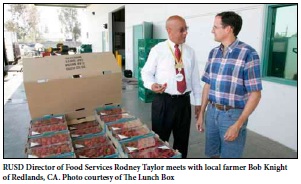Riverside a Rockstar in Healthy School Food Movement
By Liz Gonzalez

Riverside, CA: Lemon Herb Rotisserie Chicken, Apple Berry Chicken Salad, Vegetarian Wrap It Up -- don’t sound like the lunch menu many of us remember in school, but these are some of the everyday choices for students at Arlington High School.
Riverside Unified School District, home to Arlington, is in fact way ahead of the curve when it comes to implementing the Healthy, Hunger-Free Kids Act of 2010. Championed by First Lady Michelle Obama, the act aims to tackle childhood hunger and obesity levels across the country by raising nutritional standards for the first time in more than 15 years.
Rodney Taylor, director of nutrition services for the Riverside Unified School District, is considered a “rock star” in the effort. “I want for the 43,000 children enrolled in the district what I want for my own two sons,” he told a classroom full of ethnic media at a recent news briefing about the changes taking place in school cafeterias across the country.
With more than 30 years of experience in the culinary arts, Taylor found his passion in food service and even established a national model, the “Farmer’s Market Salad Bar” (FMSB) program in 1997, while working as the director of Food and Nutrition Services in the Santa Monica-Malibu Unified School District. He brought this program to Riverside in 2005.
The salad bar features locally grown produce and helps teach elementary school kids to be lifelong healthy eaters by increasing access and availability of fruits and vegetables, and through hands-on education components that include field trips to farms, school gardens and farmer visits to classrooms.
RUSD is California’s 15th largest school district, with 68 percent of the students qualifying for free or reduced meals. The district prepares 35,000 nutritious meals a day. Under Taylor’s direction, the district has transformed the food program’s $3.1 million deficit in 2002 to a $5.7 million reserve today, money that goes back into the program.
“Taking the potato chips off the plates saved 23 cents, and with that we were able to buy locally grown fruit at the peak of the season,” Taylor explained.
Last year, the district committed to not serving any canned fruits or frozen vegetables. “Everything is fresh, 60 percent of what we buy is locally grown from farmers.”
Taylor said that adding healthier options to students’ diet can “absolutely modify” their eating behaviors. He cited a two-year study by the University of North Carolina at Chapel Hill, which found that the presence of salad bars in schools increased the consumption of fruits and vegetables among students.
Another indicator Taylor points to is that they currently feed over 70 percent of the children in the district. In 2002, that number was just 47 percent. “What this tells you is we’ve been successful in changing perceptions,” noted Taylor.
Chef Ryan Douglas, the district’s catering manager and executive chef, joined Taylor’s team in 2008 after working for three years as a chef at UC Riverside. He was charged with three tasks: Change the perception of food in the schools, bolster the catering department, and change the menu of the districts café, which is open to the public.
“Passion can be infectious, and working with likeminded individuals you can accomplish a lot,” he said, reflecting on the work he’s done over the last couple of years. Those efforts include creating an impressive signature line of salads and sandwiches for the district.
In 2010, Chef Ryan met with the first lady and 500 chefs from around the country to help launch the “Let’s Move” campaign to fight childhood obesity.
Partnering with the Women, Infants and Children (WIC) program, he just finished taping six episodes, where he taught parents and students how to prepare culturally appropriate foods that were simple, inexpensive and healthy. They will be aired throughout Riverside County in WIC offices.
Luis Nareja, a junior at Arlington, describes himself as a “food enthusiast,” who applauds the changes in his school meals. There’s no “mystery meat” any more, “The cartoons on TV call school food ‘nasty.’ But the food is actually good, healthy [and] it fills you.”
“If they [students] don’t have a breakfast when they go to school, just getting past those first periods is almost horrendous for some of those young people,” said Terrance Stone, executive director of Young Visionaries Youth Leadership Academy. “Healthy eating starts at home, but if there is no home, then healthy eating has to start in our school districts,” he observed.
The briefing organized by New America Media was the third in a series across the state and drew over a dozen reporters from as far away as Orange County, Los Angeles and Coachella.
-------------------------------------------------------------------------------------

